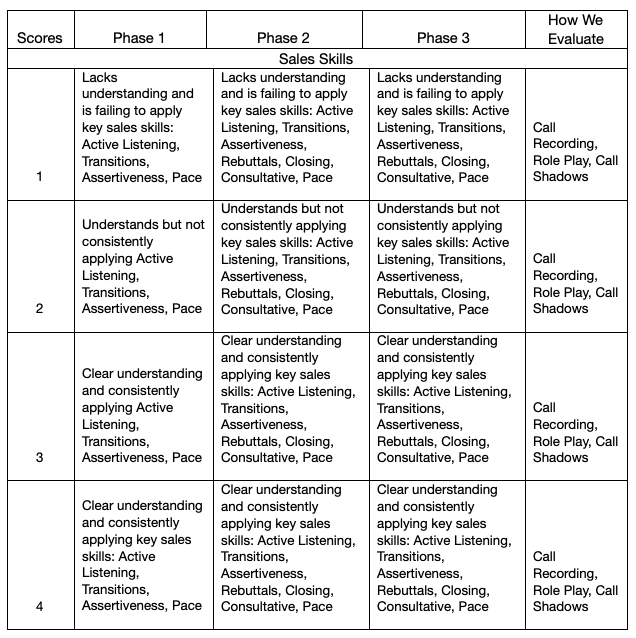This article is part of the Crunchbase Community Contributor Series. The author is an expert in their field and a Crunchbase user. We are honored to feature and promote their contribution on the Crunchbase blog.
Please note that the author is not employed by Crunchbase and the opinions expressed in this article do not necessarily reflect official views or opinions of Crunchbase, Inc.
Sales has been, and always will be, the linchpin for many technology companies. Outside of the obvious revenue growth, they also drive companywide culture and are on the front lines of talking to customers every day, which then informs product roadmap, new markets and marketing strategies. Simply put, getting sales right is the difference between success and failure.
And the root cause for a lot of good or bad comes down to how skilled your team is. If you don’t have a properly trained sales team, hitting revenue targets as you grow will be difficult if not impossible. Missed targets created rifts in culture and then the snowball effect is well on its way.
Here are five ways to ensure your sales team is ready and skilled to grow as you scale your fast-growing startup.
1. Get your culture right and focus on appreciation vs. recognition.
The average sales turnover rate is 35 percent, which is nearly triple the average turnover rate across all industries (13 percent). So why are sales professionals more likely to leave their jobs compared to other occupations? Appreciation — or lack thereof — often plays a key role. Sales leaders need to recognize the importance of this from Day One and build a culture where they’re not only recognizing people for their wins (what they do) but also appreciating people for the ongoing work they are doing (who they are).
When I created Groupon’s Sales Onboarding department, we had over 450 sales reps graduate in 18 months from the program and made it a point to believe in every one of them as a performance improvement strategy. In other words, we followed the Pygmalion Effect and it worked.
Do you want to do better at this in a remote-work world? Then prioritize 1:1 coaching. A manager’s job is to find out why someone is great and then coach and work with each person uniquely to maximize their output. Similarly, you should spend as much, if not more, time with their top performers as you do with those missing quotas. By doing this, you will find ways to empower, add value, and coach and develop these employees, which increases the likelihood of them hitting goals and decreases the likelihood that you will lose these top performers to turnover.
Each 1:1 time creates more opportunities to create a culture built on appreciation vs. recognition.
2. Seek ongoing feedback to evolve and improve your onboarding process.
Sales enablement has two customers: the rep and the manager. With any fast-growing company, it’s essential to constantly evaluate the new hire onboarding process, a key piece of enablement. In order to effectively accomplish this, teams need to look at data and insights from all parties involved — request intel from recruiting, solicit feedback from the new hire’s manager AND talk with the new hire about their experience. What could we have done differently to better prepare you for success? What can we add to the onboarding process to improve this experience for our next hire?
Your onboarding process should never be set in stone but instead should be something that you’re constantly iterating on as you grow and improving on with each new hire. Being able to answer “How well do you know your customer?” is key to creating a successful and scalable onboarding experience.
3. Clearly define what success looks like.
Whether you’re managing a team of 12 or 112 sales professionals, scorecards and rubrics will be key in keeping them focused and on track. Vague goals produce vague results. Instead, sales leaders need to clearly define what success looks like with quantitative and qualitative time-based performance metrics across all areas of their job: sales process, sales skills, effort/drive/energy, deal structure acumen, and attitude/behavior.
Below is an example of the Qualitative rubric we used to evaluate employee’s sales skills at a company that was adding 30-50 new sales reps per month for nearly two years. If we made it just about performance, we would have missed out on the best indicator for future success, which is behavior and skill development. This same structure can still be applied to most sales organizations today.


4. Learn from your bad hires.
Hiring 10 and hoping three stay is still unfortunately commonly used today as a hiring strategy when scaling sales, but it’s flawed and doesn’t have to be that way. You’re going to make bad hires, that’s a given for any fast-growing sales team. And while no one wants this to ever be the case, what you learn from these situations is most important. Why did this person fail? What red flags did you miss during the interview process?
Evaluate and analyze your bad hires just as you do your top performers so you can make marginal gains from these experiences. For example, if a person didn’t perform because they lacked resilience, make evaluating for this quality a core aspect of your next interview process. You have to expect to hire 10 rock stars and have all 10 of them stay; learning from your mistakes and your previous bad hires will be key to success for this.
5. Embrace diversity and you’ll see winning results.
When I reflect back on the reasons I wanted to start Victory Lap, one story always sticks out. I was coaching two entry-level sales reps with two very different backgrounds — one played football at an Ivy League school and the other did not graduate college. The football player (Hispanic male) and the individual who did not graduate (white female) were neck to neck in their struggles to success.
It was inspiring because sales really is a career path that can literally change lives and everyone starts at the same point in the journey to greatness no matter their background, color or gender.
But in reality, employers can be the blockers. Their job descriptions are outdated and uninformed, which results in a very high turnover rate costing the company thousands of dollars. Employers need to embrace who they bring to their sales teams and leverage these lessons to yield predictable greatness. Doing so with a diverse team will only increase the probability.
Brian Bar is the Founder and CEO of Victory Lap, a leading sales education company based in Chicago. He oversees the design and implementation of all the company’s training engagements including its sales bootcamps, university partnerships and corporate education engagements. He’s also a guest lecturer at Northwestern Kellogg School of Management on the topic of B2B Sales.






